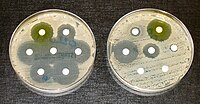
Photo from wikipedia
Purpose. The implementation and optimization of molecular rapid diagnostic tests (mRDTs) as an antimicrobial stewardship intervention for patients with bloodstream infections (BSIs) are reviewed. Summary. All U.S. acute care hospitals… Click to show full abstract
Purpose. The implementation and optimization of molecular rapid diagnostic tests (mRDTs) as an antimicrobial stewardship intervention for patients with bloodstream infections (BSIs) are reviewed. Summary. All U.S. acute care hospitals accredited by the Joint Commission are required to implement an antimicrobial stewardship program (ASP). Of the many interventions available to ASPs, mRDTs have demonstrated consistent, meaningful results on antimicrobial optimization and patient outcomes. Even among infectious diseases and antimicrobial stewardship–trained pharmacists, significant knowledge and familiarity gaps exist regarding available mRDTs and how best to implement and optimize them. Given the paucity of infectious diseases and/or antimicrobial stewardship–trained pharmacists, the mandates for establishing ASPs will require non‐infectious diseases/antimicrobial stewardship–trained pharmacists to implement stewardship interventions, which may include mRDTs, within their institution. Optimization of mRDTs requires adequate diagnostic stewardship, specifically evaluating how mRDT implementation may decrease costs and assist in meeting antimicrobial stewardship regulatory requirements. Knowledge of how these technologies will augment existing microbiology and antimicrobial stewardship workflow is essential. Finally, selecting the right mRDT necessitates familiarity with the instrument’s capabilities and with the institutional antibiogram. Conclusion. mRDTs have demonstrated the ability to be one of the most powerful antimicrobial stewardship interventions. Pharmacists required to implement an ASP in their institution should consider mRDTs as standard of care for patients with BSIs.
Journal Title: American Journal of Health-System Pharmacy
Year Published: 2018
Link to full text (if available)
Share on Social Media: Sign Up to like & get
recommendations!